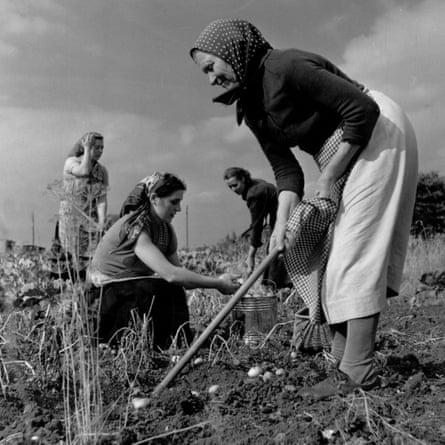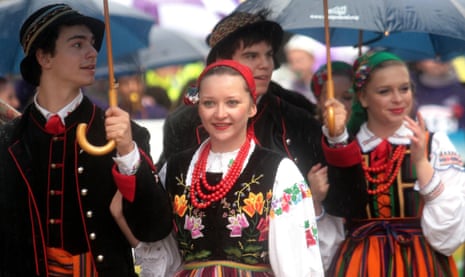In 2004, when Poland joined the European Union and Britain became one of the few countries to open its borders to Polish migrants, our presence in the country was much needed.
At the time, Britain required more labour to boost the economy, and Poles – numerous, determined, hard-working, and (let’s be honest) cheap – provided this.
Most stories of post-accession migrants from Poland start in the same place: with an underpaid position well below their qualifications, working as a porter, cleaner, waiter or bartender in a crowded bar, restaurant or hotel.
For years, the exchange rate between sterling and Polish złoty was enough to compensate for swallowed pride, as highly-educated young Poles temporarily abandoned their plans to work in an industry they loved for the sake of earning more money.
Contrary to the rhetoric of some British red-top papers, these migrants were also never keen on leaving their friends and home just for the sake of £200 in benefits.
Poles who decided to leave their country and try their luck in Britain wanted a better life, but also a clear chance to develop themselves.
Home Office figures released on Thursday show that Polish people have now become the biggest foreign-born population in Britain, with 831,000 living in the UK in 2015.
The second largest group were people born in India, at 795,000. And while one wave of immigration began after 2004, to understand the Polish community’s history you have to look back further, to the second world war.
If you ever meet a Polish wartime immigrant to Britain, ask them about their luggage. There is a fair chance they still keep a hastily-packed bag of personal belongings that they managed to grab while fleeing wartorn Poland.
When this wave of Poles arrived in Britain – mostly as members of the Polish army in the west – they saw themselves as temporary exiles and refugees, not emigrants.
Britain was a country they did not expect, or frankly want, to be their home. Having finally regained independence and control over Poland after 123 years of military occupation, Poles had no intention whatsoever of fleeing the land their ancestors had fought so hard for.
Having fought in the Atlantic and the Battle of Britain, they settled across the UK; their tightly-packed bags remaining the only symbol of their homeland and their hope of return to Poland.
Although they admired their new country, they wanted one thing above everything else: to go home. The packed bag was always ready, as if they were just waiting for a connecting flight; waiting for the opportunity to return.

But as a Moscow-imposed government took power in Poland, it was clear they would need to wait longer. Britain felt exotic to them, and so, in a postwar phrase they coined, they concluded: “We have landed on Mars and to stay alive we have to build our Poland.”
They did in both literal ways – the Polish government-in-exile chose London for its headquarters – and more general ones, establishing organisations that revived the prewar spirit of Poland: social clubs, theatres, restaurants, associations.
To fulfil their dreams of seeing a free, independent Poland, the migrants had to wait more than 40 years, much longer than any of them expected.
By the time Poland started its democratic transition in 1989, their still-packed bags were covered with dust, their distance from Poland having grown as they aged, made new friends and started relationships, had kids, bought houses; their love for their second home growing all the time. They were accidental Polish Brits, but Polish Brits all the same.
This historical context is important because it meant that in 2004 the migrants who arrived did not have to build their own world. Their bags – carried by numerous low-fare airlines – no longer carried existential worries, but appetites for a better living awakened by Poland’s much-delayed economic transition.
Make no mistake, Poland has changed enormously since 2004 – becoming one of the most successful economies in Europe – and so have the Polish migrants living in the UK.
In the intervening years they’ve gained confidence in their value, built their social skills, and developed fluency in English, while becoming aware of all the opportunities out there. The myth of the Polish builder is fading away as a new, more complex profile emerges.
According to the latest statistics, as many as 92% of Polish migrants are in employment or education, the highest level among all nationalities, including the British.
Slowly but surely they are climbing up the social ladder, taking more complicated and fitting positions across a number of industries. In fact, with networks of Polish companies – more than 30,000 individual businesses – becoming well-established, Polish migrants are increasingly creating new jobs for other people, instead of taking someone else’s.
For many modern migrants, Britain has genuinely become their second home and this time a voluntary one, as they see this country as a place worthy of investing their talents, skills and future.
As they made progress in their careers, settled down, bought homes, started (often multicultural) families, they were ready to unpack the historical luggage once and for all and stay in Britain for ever. Or so they thought – until the morning after the EU referendum.
Following xenophobic attacks and hate crime incidents targeting the community in the first weeks after the vote, many were left shaken and worried about their security.
The exchange rate is no longer the main reason why many Poles want to stay in Britain – they have genuinely fallen in love with the country. We hope, after Brexit, it will remain a mutual feeling.
Jakub Krupa is the UK correspondent for the Polish Press Agency and a social activist.








